
C H A P T E R O N E

Introduction to the Way
Beyond the West
 A little over six years ago [1953], I began a series of radio programs that have been running ever since under the general title Way Beyond the West. I think I may as well give you a short explanation of that title. It obviously has a double meaning. The first is geographical. The West Coast of the United States faces Asia across the Pacific. The Asian world is therefore literally way beyond the West. The second reason for choosing this title is that the English word way is perhaps the nearest translation that we can make to the Chinese word tao. It is usually pronounced "dow." The Tao means many things. Primarily, it means the way of nature, the process of the universe. But it also means a way of life, a way of living in accordance with that process. For example, in Japan there are many crafts and arts, and even sports, that have been influenced by Eastern philosophy and are called "ways." You all know the word judo. Ju means "gentle," do is the Japanese way of pronouncing tao. Therefore, judo is the gentle way. Similarly, the japanese also speak of fencing as kendo, the way of the sword. They speak of the tea ceremony sometimes as chado, the way of tea. In japanese culture there are all sorts of these dos, and they not only indicate the technique or mastery of the technique of performing the given art but also imply that the art involves a way of life. Indeed, in almost the ancient Western medieval sense, every japanese art is a mystery. One used to speak, you see, of the mystery of being a goldsmith, the mystery of being a stonemason, the mystery of being a carpenter. Today that probably strikes us as extraordinarily peculiar terminology: But the meaning of it was that every mans vocation in life-what the Indians call svadharma, which means approximately ones own function, one's own calling-is also a way of initiation into the mystery of life. It has a sort of religious function. So then, the "way" in this title, Way Beyond the West, is the way of deeper understanding, or something like that. But why do I say that this way of deeper understanding is beyond the West? The answer, I think, is that we have lost the idea that our occupations are vocations. Not everybody has. But to a very large degree, our idea of an occupation is that it is a way of making money. We make a very, very destructive division between work and play. We spend eight hours, or whatever it may be, at work in order to earn the money to enjoy ourselves in the other eight hours. And that is a perfectly ridiculous way of living. It is much better to be very poor indeed than to do something so stupid as boring ourselves and wasting ourselves for eight hours in order to be able to enjoy ourselves the other eight hours. The result of this fantastic division between work and play is that work becomes drudgery, and play becomes empty. When we say that our occupation should also be our vocation, we are speaking of a conception of life within which work and play should be identical.
A little over six years ago [1953], I began a series of radio programs that have been running ever since under the general title Way Beyond the West. I think I may as well give you a short explanation of that title. It obviously has a double meaning. The first is geographical. The West Coast of the United States faces Asia across the Pacific. The Asian world is therefore literally way beyond the West. The second reason for choosing this title is that the English word way is perhaps the nearest translation that we can make to the Chinese word tao. It is usually pronounced "dow." The Tao means many things. Primarily, it means the way of nature, the process of the universe. But it also means a way of life, a way of living in accordance with that process. For example, in Japan there are many crafts and arts, and even sports, that have been influenced by Eastern philosophy and are called "ways." You all know the word judo. Ju means "gentle," do is the Japanese way of pronouncing tao. Therefore, judo is the gentle way. Similarly, the japanese also speak of fencing as kendo, the way of the sword. They speak of the tea ceremony sometimes as chado, the way of tea. In japanese culture there are all sorts of these dos, and they not only indicate the technique or mastery of the technique of performing the given art but also imply that the art involves a way of life. Indeed, in almost the ancient Western medieval sense, every japanese art is a mystery. One used to speak, you see, of the mystery of being a goldsmith, the mystery of being a stonemason, the mystery of being a carpenter. Today that probably strikes us as extraordinarily peculiar terminology: But the meaning of it was that every mans vocation in life-what the Indians call svadharma, which means approximately ones own function, one's own calling-is also a way of initiation into the mystery of life. It has a sort of religious function. So then, the "way" in this title, Way Beyond the West, is the way of deeper understanding, or something like that. But why do I say that this way of deeper understanding is beyond the West? The answer, I think, is that we have lost the idea that our occupations are vocations. Not everybody has. But to a very large degree, our idea of an occupation is that it is a way of making money. We make a very, very destructive division between work and play. We spend eight hours, or whatever it may be, at work in order to earn the money to enjoy ourselves in the other eight hours. And that is a perfectly ridiculous way of living. It is much better to be very poor indeed than to do something so stupid as boring ourselves and wasting ourselves for eight hours in order to be able to enjoy ourselves the other eight hours. The result of this fantastic division between work and play is that work becomes drudgery, and play becomes empty. When we say that our occupation should also be our vocation, we are speaking of a conception of life within which work and play should be identical.
It is interesting that Hindus, when they speak of the creation of the universe, do not call it the work of God, they call it the play of God, the Vishnu-lila, lila meaning "play." And they look upon the whole manifestation of all the universes as a play, as a sport, as a kind of dance-lila perhaps being somewhat related to our word lilt. We in the West have tended to lose the idea of our work, our profession, as being a way, a tao. Furthermore, our religions tend very much to lose sight of themselves as being a tao, or way. To a very large extent, Christianity, in what we might call its standard brand forms, does not quite fulfill the function that Buddhism and Vedanta, which is the central doctrine of Hinduism and Taoism, fulfill in Asian society.
Now, mind you, these ways I am talking about in Asia are not followed by an enormous number of people, except in a kind of nominal, superficial way. And I am not trying to make any vast comparisons between Asian society and Western society or to say that the total Asian way of life is superior to ours. I do not think it is, but I do not think it is necessarily inferior, either; it is just different. But the fact remains that there is an aspect of Asian religion and philosophy that is very subdued in Western religion and philosophy, so that you might say that the Way, in the sense of the Chinese Tao, does not quite exist in the West, in any recognizable form. It does exist, yes. It exists unofficially, it exists occasionally, but it is never clearly recognized. So, therefore, I want to devote some time now to going quite thoroughly into what these Eastern Ways are.
Now, when we are first introduced to such subjects as Buddhism or Vedanta or Taoism or Confucianism, we usually encounter them as some form of religion. We may have read books on comparative religion in which these phenomena are classified with Judaism, Christianity, Islam, and so on. But this is really very misleading. It is as misleading as if you were to get a textbook on botany, on flowers, and suddenly came across a few chapters on birds. You would think this was a rather odd classification. Well, if you know anything much about these forms of Asian spirituality, you get the same kind of a funny shock when you see them classified along with such things as Christianity or Judaism. This is not to say that they are superior to Christianity and Judaism; they are simply different. They have different functions. And when we classify them all as various forms of religion, then a discussion arises as to which is the best one for everybody or the best for you or me. But I think the difference is much more subtle than that. And I can best approach this difference by saying that in the West we have primarily three forms of wisdom-religious, philosophical and scientific-but a way in the Asian sense is none of these.
First of all, the word religion comes from the Latin root religare, which means "a rule of life." Religare means "to bind, to bind oneself to something." We say of a person who has become a monk or a nun that he or she has gone into religion, which means that they have accepted a rule of life involving certain vows of poverty, chastity, and obedience, and other things as well. And the rule of life that constitutes a religion seems to me to consist of a creed, first of all, which is a system of revealed ideas about man and the universe and God, which one believes in and puts one's faith in.
The great Asian ways that I am speaking of do not, strictly speaking, have any creeds. They do not involve belief. That is to say, they do not involve committing oneself to certain positive opinions about life. Almost to the contrary, they abandon ideas and opinions because what they are concerned with is not ideas, not theories, but experience; experience in the sense almost of sensuousness, for instance, as they say, you drink water and know for yourself that it is cold. So, it is knowledge rather than faith that they are concerned with. Faith, as I am using it here, refers to a system of belief rather than a sense of trust. Very often it seems to me that faith and belief could be opposed. Belief comes from the Anglo-Saxon root lief, which means "to wish." Belief is the fervent hope that certain things are true. Whereas I rather feel that faith is an openness of attitude, a readiness to accept the truth, whatever it may turn out to be. It is a commitment of oneself to life, to the universe, to ones own nature as it is, in the realization that we really have no alternative. When you get into the water to swim, you have to trust yourself to the water. If you tighten your muscles and cling to the water, you will sink.

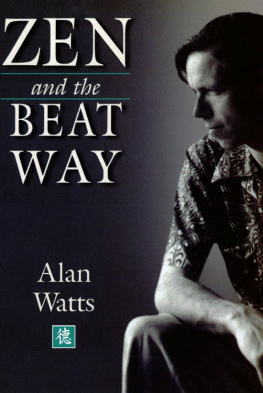
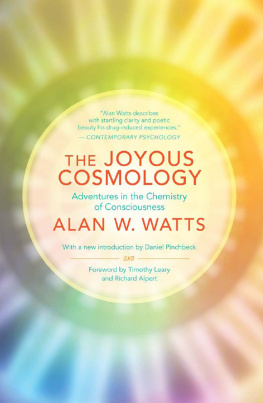
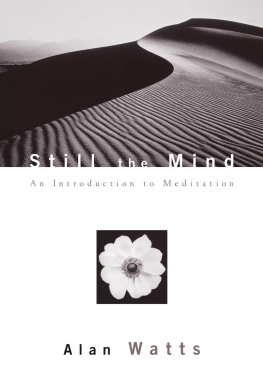
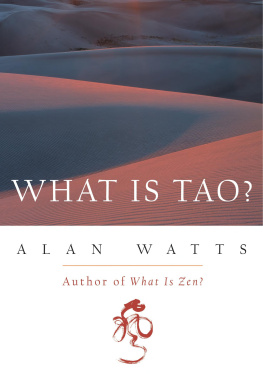
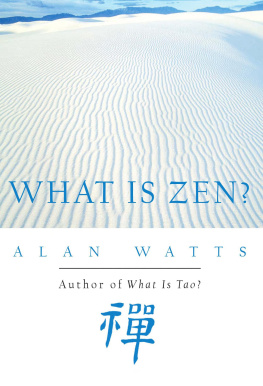

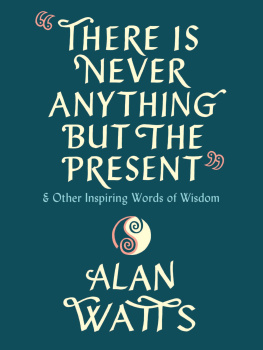
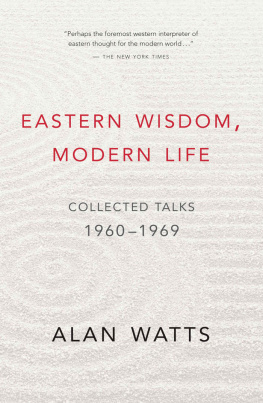
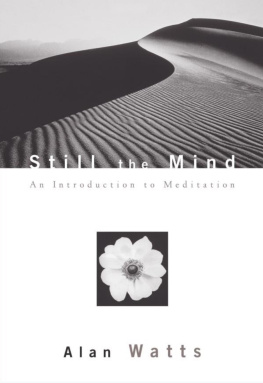

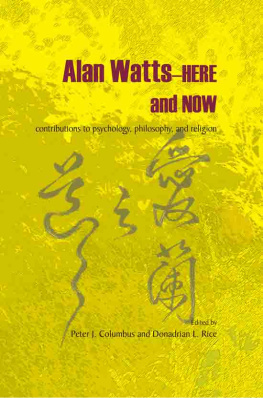
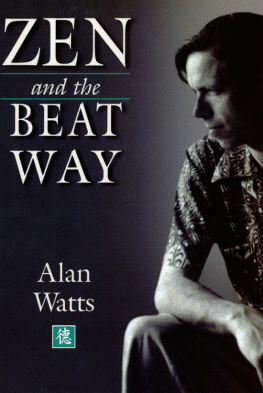
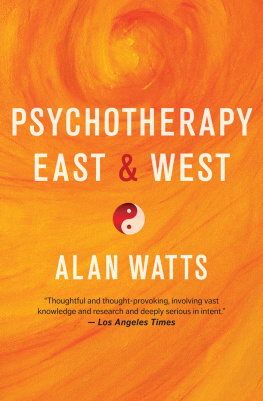

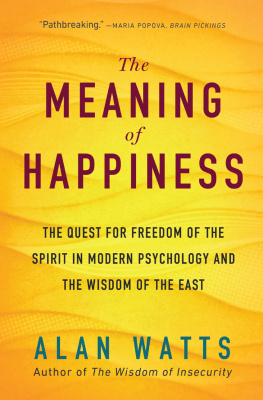
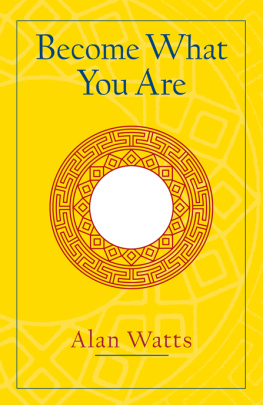




 A little over six years ago [1953], I began a series of radio programs that have been running ever since under the general title Way Beyond the West. I think I may as well give you a short explanation of that title. It obviously has a double meaning. The first is geographical. The West Coast of the United States faces Asia across the Pacific. The Asian world is therefore literally way beyond the West. The second reason for choosing this title is that the English word way is perhaps the nearest translation that we can make to the Chinese word tao. It is usually pronounced "dow." The Tao means many things. Primarily, it means the way of nature, the process of the universe. But it also means a way of life, a way of living in accordance with that process. For example, in Japan there are many crafts and arts, and even sports, that have been influenced by Eastern philosophy and are called "ways." You all know the word judo. Ju means "gentle," do is the Japanese way of pronouncing tao. Therefore, judo is the gentle way. Similarly, the japanese also speak of fencing as kendo, the way of the sword. They speak of the tea ceremony sometimes as chado, the way of tea. In japanese culture there are all sorts of these dos, and they not only indicate the technique or mastery of the technique of performing the given art but also imply that the art involves a way of life. Indeed, in almost the ancient Western medieval sense, every japanese art is a mystery. One used to speak, you see, of the mystery of being a goldsmith, the mystery of being a stonemason, the mystery of being a carpenter. Today that probably strikes us as extraordinarily peculiar terminology: But the meaning of it was that every mans vocation in life-what the Indians call svadharma, which means approximately ones own function, one's own calling-is also a way of initiation into the mystery of life. It has a sort of religious function. So then, the "way" in this title, Way Beyond the West, is the way of deeper understanding, or something like that. But why do I say that this way of deeper understanding is beyond the West? The answer, I think, is that we have lost the idea that our occupations are vocations. Not everybody has. But to a very large degree, our idea of an occupation is that it is a way of making money. We make a very, very destructive division between work and play. We spend eight hours, or whatever it may be, at work in order to earn the money to enjoy ourselves in the other eight hours. And that is a perfectly ridiculous way of living. It is much better to be very poor indeed than to do something so stupid as boring ourselves and wasting ourselves for eight hours in order to be able to enjoy ourselves the other eight hours. The result of this fantastic division between work and play is that work becomes drudgery, and play becomes empty. When we say that our occupation should also be our vocation, we are speaking of a conception of life within which work and play should be identical.
A little over six years ago [1953], I began a series of radio programs that have been running ever since under the general title Way Beyond the West. I think I may as well give you a short explanation of that title. It obviously has a double meaning. The first is geographical. The West Coast of the United States faces Asia across the Pacific. The Asian world is therefore literally way beyond the West. The second reason for choosing this title is that the English word way is perhaps the nearest translation that we can make to the Chinese word tao. It is usually pronounced "dow." The Tao means many things. Primarily, it means the way of nature, the process of the universe. But it also means a way of life, a way of living in accordance with that process. For example, in Japan there are many crafts and arts, and even sports, that have been influenced by Eastern philosophy and are called "ways." You all know the word judo. Ju means "gentle," do is the Japanese way of pronouncing tao. Therefore, judo is the gentle way. Similarly, the japanese also speak of fencing as kendo, the way of the sword. They speak of the tea ceremony sometimes as chado, the way of tea. In japanese culture there are all sorts of these dos, and they not only indicate the technique or mastery of the technique of performing the given art but also imply that the art involves a way of life. Indeed, in almost the ancient Western medieval sense, every japanese art is a mystery. One used to speak, you see, of the mystery of being a goldsmith, the mystery of being a stonemason, the mystery of being a carpenter. Today that probably strikes us as extraordinarily peculiar terminology: But the meaning of it was that every mans vocation in life-what the Indians call svadharma, which means approximately ones own function, one's own calling-is also a way of initiation into the mystery of life. It has a sort of religious function. So then, the "way" in this title, Way Beyond the West, is the way of deeper understanding, or something like that. But why do I say that this way of deeper understanding is beyond the West? The answer, I think, is that we have lost the idea that our occupations are vocations. Not everybody has. But to a very large degree, our idea of an occupation is that it is a way of making money. We make a very, very destructive division between work and play. We spend eight hours, or whatever it may be, at work in order to earn the money to enjoy ourselves in the other eight hours. And that is a perfectly ridiculous way of living. It is much better to be very poor indeed than to do something so stupid as boring ourselves and wasting ourselves for eight hours in order to be able to enjoy ourselves the other eight hours. The result of this fantastic division between work and play is that work becomes drudgery, and play becomes empty. When we say that our occupation should also be our vocation, we are speaking of a conception of life within which work and play should be identical.